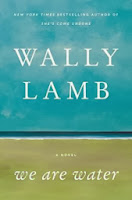Certain authors have a talent to fully occupy their characters and immerse themselves in their voices, a mighty feat when creating characters completely different from their own lives. Wally Lamb has demonstrated that ability quite impressively since his first novel, She's Come Undone, where his portrayal of an overweight woman was so spot-on, I had to flip back and forth to his picture on the back cover of the book more than a few times.
He once again demonstrates that talent in his latest novel, the melodramatic but thought-provoking We Are Water. Told from the perspectives of eight different characters, sometimes the concept moves the story forward and sometimes it disconnects you from it, but there's no doubt that each of the voices Lamb created are unique and affecting, if not a bit stereotypical at times.
Annie Oh didn't decide to pursue a career as an artist until her children were grown, but she found notoriety and success with her controversial shadowboxes. However, this success created great upheaval in her life, as it led to the end of her marriage to psychologist Orion, and her relationship with her art dealer, gallery owner Viveca. Annie and Viveca plan to marry in Annie's Connecticut hometown of Three Rivers.
A new, later-in-life marriage nearly always brings drama, especially when it is a same-sex marriage. For Orion, Annie's upcoming wedding causes him to reflect on the successes and failures of their relationship, and at the same time, he is forced to dwell on the premature end of his career.
Annie and Orion's three children—Andrew, the former rebel, now in the military and a born-again Christian; his twin sister Ariane, the bookish, "good" child; and free-spirited Marissa, the baby of the family—each have their own crises to deal with as well as their feelings about the end of their parents' marriage and Annie's new relationship. And just like other times when family members gather together, the upcoming wedding is an opportunity to revisit old hurts and hidden secrets, and confront issues that provoke anger and hurt.
If We Are Water had concentrated mainly on Annie, Orion, and their three children, the book would have been stronger. But in trying to explore latent issues regarding racism, prejudice, and psychological issues, Lamb brought in peripheral characters that really pulled the book off track, even when you realized the coincidences of their inclusion. And having to read several chapters written from the perspective of a pedophile, as well as one chapter that depicted a conversation between Andrew's Christian fiancée and conservative radio personality Dr. Laura, was very difficult and jarring.
In the end, I felt as if this book had tremendous potential and a compelling story at its core, but Lamb packed it a little too full of melodrama. (One criminal act, in particular, was utterly unnecessary.) However, Lamb's storytelling ability still makes this book worthwhile to read, because the characters he created are vivid, if not entirely appealing.

No comments:
Post a Comment